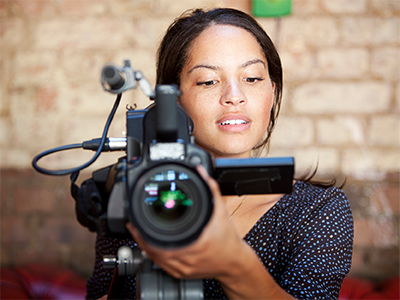The Duty of Lawful Videography in Depositions and Trials
Legal videography has actually become a crucial device in both depositions and tests, offering a multifaceted method to documenting witness testimonies. By recording not only the talked word however also the nuances of non-verbal communication, this medium boosts the trustworthiness of statements and preserves essential evidence for future process (legal videography). As attorneys significantly recognize its worth, it prompts a much deeper evaluation of just how these visual documents can affect juror perceptions and test outcomes. What effects might these developments hold for the future of lawful technique?

Value of Lawful Videography
Lawful videography plays a critical function in the documents and discussion of depositions and trials. This customized field combines technical skills with legal understanding to develop a trustworthy document of proceedings that can considerably influence case results. The visual element of lawful videography enhances the understanding of witness testimony, allowing jurors and courts to observe not only the talked words but also the temperament, emotions, and body language of the witnesses.
Additionally, lawful videography supplies an objective account of events, lessening the capacity for misinterpretation that can take place with created transcripts alone. This visual documentation works as an important tool throughout trial discussions, assisting in a clearer and even more influential story for both plaintiffs and accuseds. Additionally, the capacity to replay video sectors during court proceedings allows lawful groups to highlight crucial factors, enhancing their disagreements efficiently.
The value of lawful videography prolongs past the courtroom; it likewise plays an essential role in protecting proof for future recommendation, whether for appeals or additional lawful action. Therefore, its assimilation into the legal procedure is necessary for guaranteeing a reasonable and exact depiction of the facts, ultimately contributing to the quest of justice.

Refine of Legal Videography
While recording the subtleties of depositions and trials, the process of lawful videography includes a number of crucial actions that make certain top quality, accurate recordings. Initially, a specialist legal videographer prepares by reviewing the instance materials and understanding the details requirements of the deposition or test. This prep work includes acquainting themselves with the participants and the context, which assists in catching relevant information.
On the day of the recording, the videographer sets up the essential devices, which generally consists of high-definition electronic cameras, microphones, and appropriate lights. Guaranteeing optimum angles and sound top quality is crucial, as it directly affects the effectiveness of the recording. The videographer communicates with attorneys and participants to establish methods, guaranteeing that everybody recognizes the recording process.
Throughout the deposition or test, the videographer thoroughly videotapes the proceedings, paying close interest to both spoken and non-verbal cues. This includes catching the demeanor and reactions of witnesses and read review attorneys. After the session ends, the videographer might edit the footage for clearness and conformity with legal standards, creating an end product that accurately mirrors the procedures for future recommendation and usage in legal contexts.
Advantages in Depositions
The consolidation of videography in depositions provides countless benefits that boost the general process of collecting proof. One key advantage is the ability to record witness statements with visual and auditory fidelity, offering a much more accurate representation of the witness's attitude, tone, and body movement. This multidimensional technique enables lawyers and juries to evaluate trustworthiness better than traditional written transcripts alone.
In addition, videographed depositions work as an effective tool for preserving statement. Must a witness come to be not available for trial, their recorded deposition can be played in court, ensuring that their proof stays available and pertinent. This facet significantly reduces the risk of losing crucial details that might impact instance results.

Finally, videography improves the total professionalism of the deposition process, instilling confidence in clients relating to the thoroughness of their lawful depiction (legal videography). By leveraging technology, legal professionals can substantially enhance the performance of depositions
Influence On Tests
In several tests, the assimilation of videography can significantly influence the discussion of proof and the court's understanding. Legal videography catches witness testaments and vital evidence in a dynamic format, permitting jurors to involve with the product on several levels. This aesthetic element improves the storytelling aspect of a test, supplying context and emotional resonance that traditional text-based proof may do not have.
In addition, video clip recordings can work as effective tools for impeachment during interrogation. When discrepancies occur between a witness's previous declarations and their court testimony, video clip evidence offers an objective recommendation that can click reference guide jurors' viewpoints. This immediacy and clearness can reinforce the integrity of a celebration's story while simultaneously threatening opposing arguments.

Future Trends in Legal Videography
As we look toward the future of legal videography, several arising fads guarantee to reshape its duty within the court room. One substantial pattern is the combination of expert system (AI) in video clip evaluation and modifying. AI can improve the process of determining key minutes in videotaped depositions, enabling attorneys to quickly access relevant content, thereby boosting effectiveness in case prep work.
Furthermore, the rise of online reality (VIRTUAL REALITY) and augmented fact (AR) innovations is expected to change how jurors experience proof. legal videography. By immersing jurors in a substitute environment, these modern technologies can provide an extra profound understanding of intricate scenarios, bring about more enlightened deliberations
In addition, the enhancing demand for remote depositions, increased by the COVID-19 pandemic, will likely continue. Lawful videographers will require to adapt to new software and systems to ensure top quality recordings in digital settings.
Finally, the expanding emphasis on data protection will require more stringent protocols for saving and sharing video proof. As the lawful landscape develops, lawful videographers have to stay abreast of these patterns to preserve their importance and effectiveness in the judicial process.
Final Thought
In recap, lawful videography offers a crucial function in the judicial procedure, boosting the stability of depositions and trials. As innovation continues to evolve, lawful videography is positioned to further change its duty within the lawful landscape.